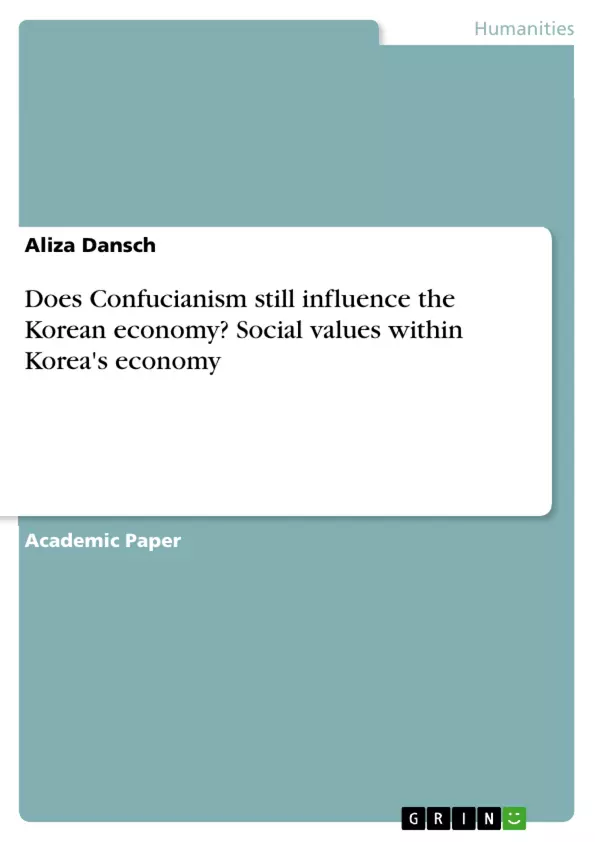The main concern of this paper is to answer the question if Confucianism still influences the Korean economy, even after the dramatic economic reform. Therefore, some scholars ascertained that century long cultural values as kind of a conservative ideology are still governing Koreans daily-life and cannot vanish quickly, as they are deeply embedded in society. However, some other researchers claim that the big impact of the globalisation let Koreas economy change into becoming more capitalistic, where individualism results into opportunism. So, companies are seeking their own profits and adapt to flexible employment structures without caring for the general employee anymore.
During the time of 1960s-1980s South Korea quickly developed from the scratch of the bottom into one of the biggest industrialized countries in the world with a rapid annual growth rate of its gross domestic product (GDP) of 9 per cent from US$1.4 in 1953 to US$437.4 in 1994. Scholars have argued that this phenomenal growth was the selective emphasize of some of the Confucian virtues, causing workers to be subordinate to their bosses and diligent within their work. When in 1997 the Asian financial crisis hit the country, South Korea had to face the globalization with all its effects, so that century-long traditions were questioned. To compete in the global market Korea´s economy, especially the chaebols, were under much pressure to restructure themselves. Moreover, massive groups of workers were early retired or laid off. To become a global player, firms had to adapt to the market flexibility and neoliberalism in order to survive.
Inhaltsverzeichnis (Table of Contents)
- Introduction
- Korea as Confucian Society
- Institutional changes in Korea
- Vanishing of Homogeneity
- Intercultural problems within the Korean working environment
- Conclusion
Zielsetzung und Themenschwerpunkte (Objectives and Key Themes)
This research paper explores the enduring influence of Confucianism on the Korean economy, particularly in the context of dramatic economic reforms and globalization. The paper examines whether Confucian values continue to shape Korean society, business practices, and work culture despite the rise of individualism and capitalist ideals.
- The impact of Confucianism on Korean economic development
- The influence of globalization and Westernization on Korean culture and society
- The changing dynamics of the Korean workforce and workplace
- The role of intercultural diversity in shaping Korean corporate culture
- The relationship between Confucian values and contemporary economic challenges in Korea
Zusammenfassung der Kapitel (Chapter Summaries)
- Introduction: The introduction sets the context for the paper by highlighting the rapid economic growth of South Korea in the 1960s and 1980s and the subsequent challenges posed by globalization and the Asian financial crisis. It frames the central question of the paper: Does Confucianism still influence the Korean economy?
- Korea as Confucian Society: This chapter examines the characteristics of Korean society as a collective and Confucian society, highlighting the emphasis on strong relationships, social responsibility, and respect for authority. It explores the role of Confucianism in shaping social norms and cultural values, particularly within the family and the workplace.
- Institutional changes in Korea: This section discusses the transformations that occurred in Korea after the IMF crisis, highlighting the shift towards capitalism and democracy, the adoption of international HRM practices, and the growing influence of Westernized corporate culture.
Schlüsselwörter (Keywords)
This research paper explores the enduring influence of Confucianism on the Korean economy, focusing on key themes like globalization, Westernization, corporate culture, intercultural diversity, and the impact of globalization on Korean society and its economy. The research also delves into the changing dynamics of the Korean workforce, specifically examining the influence of migration and interracial marriage on the corporate environment and the shifting role of Confucian values in this context.
Frequently Asked Questions
Does Confucianism still influence the modern Korean economy?
Yes, researchers argue that century-long cultural values remain deeply embedded in daily life and corporate culture, despite dramatic economic reforms and globalization.
How did Confucianism contribute to South Korea's rapid growth between 1960 and 1980?
Confucian virtues emphasized diligence and subordination to authority, which helped create a highly productive and disciplined workforce during the country's industrialization.
What was the impact of the 1997 Asian financial crisis on Korean traditions?
The crisis forced Korea to restructure its economy (especially the chaebols), leading to early retirements, layoffs, and a shift toward neoliberalism and market flexibility.
How is the Korean workplace changing due to globalization?
There is a shift from collective Confucian values toward individualism and opportunism, with companies adopting Westernized HRM practices and international corporate cultures.
What role does intercultural diversity play in contemporary Korea?
Migration and interracial marriage are creating new dynamics in the workforce, challenging the traditional homogeneity of Korean society and its Confucian foundations.
- Quote paper
- Aliza Dansch (Author), 2017, Does Confucianism still influence the Korean economy? Social values within Korea's economy, Munich, GRIN Verlag, https://www.grin.com/document/967316



